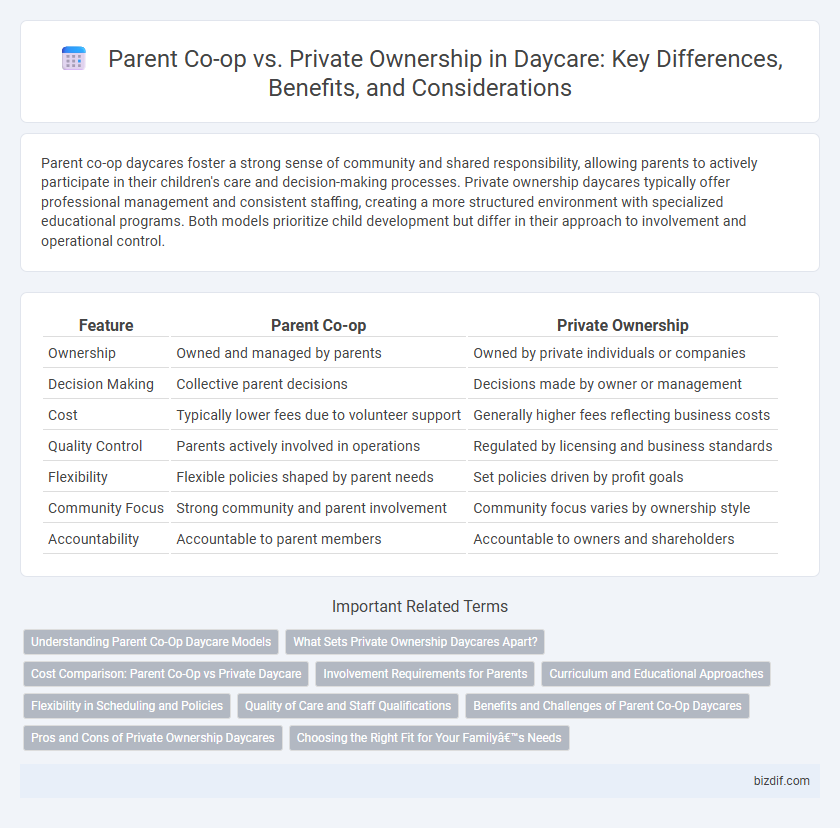Parent co-op daycares foster a strong sense of community and shared responsibility, allowing parents to actively participate in their children's care and decision-making processes. Private ownership daycares typically offer professional management and consistent staffing, creating a more structured environment with specialized educational programs. Both models prioritize child development but differ in their approach to involvement and operational control.
Table of Comparison
| Feature | Parent Co-op | Private Ownership |
|---|---|---|
| Ownership | Owned and managed by parents | Owned by private individuals or companies |
| Decision Making | Collective parent decisions | Decisions made by owner or management |
| Cost | Typically lower fees due to volunteer support | Generally higher fees reflecting business costs |
| Quality Control | Parents actively involved in operations | Regulated by licensing and business standards |
| Flexibility | Flexible policies shaped by parent needs | Set policies driven by profit goals |
| Community Focus | Strong community and parent involvement | Community focus varies by ownership style |
| Accountability | Accountable to parent members | Accountable to owners and shareholders |
Understanding Parent Co-Op Daycare Models
Parent co-op daycare models emphasize collective parental involvement in decision-making, operations, and caregiving, fostering a strong community and shared responsibility for children's development. These co-ops typically offer lower tuition fees than private-owned daycare centers by leveraging parental volunteer hours instead of relying fully on paid staff. Understanding parent co-ops involves recognizing their democratic structure and commitment to collaboration, which contrasts with the hierarchical management and profit motives of private ownership models.
What Sets Private Ownership Daycares Apart?
Private ownership daycares often provide more consistent management and specialized programs tailored to specific community needs compared to parent co-ops. These facilities typically offer extended hours, professional staff, and enhanced resources that support early childhood development. Focused investment in safety standards and curriculum innovation further distinguishes private ownership from parent co-op models.
Cost Comparison: Parent Co-Op vs Private Daycare
Parent co-op daycares typically offer significantly lower tuition fees compared to private ownership models due to parent participation in daily operations and administrative tasks. Private daycares incur higher costs from staffing, facility maintenance, and profit margins, resulting in increased monthly rates averaging 20-40% more than parent co-ops. Families seeking affordable childcare often consider parent co-ops as cost-effective alternatives while private centers provide more professional services and flexible hours.
Involvement Requirements for Parents
Parent co-op daycares require active involvement from parents, including regular participation in classroom activities, administrative tasks, and decision-making processes. This model fosters a strong community bond and shared responsibility, often reducing operational costs through volunteer work. Private ownership daycares typically have minimal parental involvement beyond drop-off and pick-up, as professional staff manage daily operations and administrative duties independently.
Curriculum and Educational Approaches
Parent co-op daycares often emphasize collaborative curriculum development, incorporating parental input to tailor educational approaches that reflect community values and promote active family involvement. Private ownership facilities typically implement standardized curricula designed by early childhood experts, focusing on structured learning objectives and evidence-based teaching methods. Both models prioritize child development but differ in flexibility, with co-ops fostering a customizable educational experience and private centers delivering consistent, professionally guided programs.
Flexibility in Scheduling and Policies
Parent co-op daycares offer greater flexibility in scheduling and policies, allowing families to tailor hours and participation based on their unique needs. Private ownership daycare centers often have fixed hours and standardized policies, prioritizing consistency and professional management. Flexibility in co-ops supports parental involvement, while private centers emphasize structured routines and regulatory compliance.
Quality of Care and Staff Qualifications
Parent co-op daycare centers often provide higher quality of care due to direct parental involvement and a strong community focus, fostering a nurturing and attentive environment. Staff qualifications in parent co-ops can vary but frequently include highly motivated caregivers committed to child development, while private ownership tends to hire staff with formal certifications and specialized training in early childhood education. The blend of parental engagement in co-ops and professional expertise in private centers significantly impacts overall daycare quality and child outcomes.
Benefits and Challenges of Parent Co-Op Daycares
Parent co-op daycares foster strong community involvement by requiring parents to actively participate in caregiving and decision-making, which boosts trust and transparency. These co-ops often provide lower fees compared to privately owned centers, yet they may face challenges like inconsistent volunteer availability and potential conflicts among parents. Balancing shared responsibilities with professional childcare standards is crucial for maintaining quality and ensuring a supportive environment.
Pros and Cons of Private Ownership Daycares
Private ownership daycares offer personalized management and the ability to implement unique educational philosophies, ensuring tailored care for children. However, they often face higher operational costs leading to increased fees for parents, and variability in quality depending on owner expertise. Limited regulatory oversight compared to cooperatives may result in inconsistent standards and fewer community engagement opportunities.
Choosing the Right Fit for Your Family’s Needs
Parent co-op daycares often foster a strong sense of community and allow parents to actively participate in their child's care, offering a cost-effective alternative to private ownership. Private ownership typically provides more consistent professional staffing and extended hours, catering to families needing flexible schedules and specialized programs. Evaluating your family's priorities, such as involvement level, budget, and scheduling needs, is essential in selecting the right daycare model.
Parent Co-op vs Private Ownership Infographic

 bizdif.com
bizdif.com